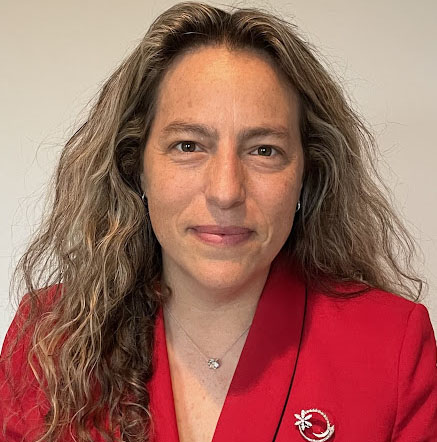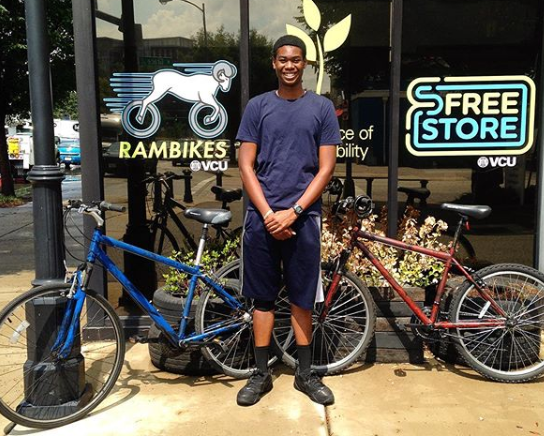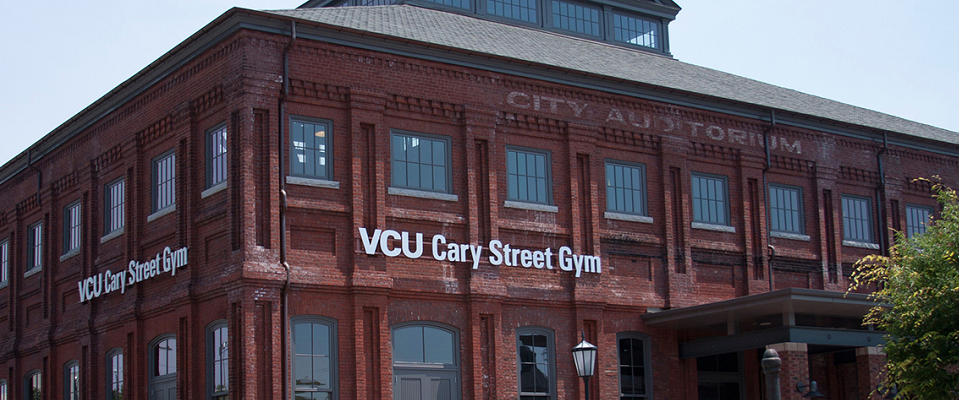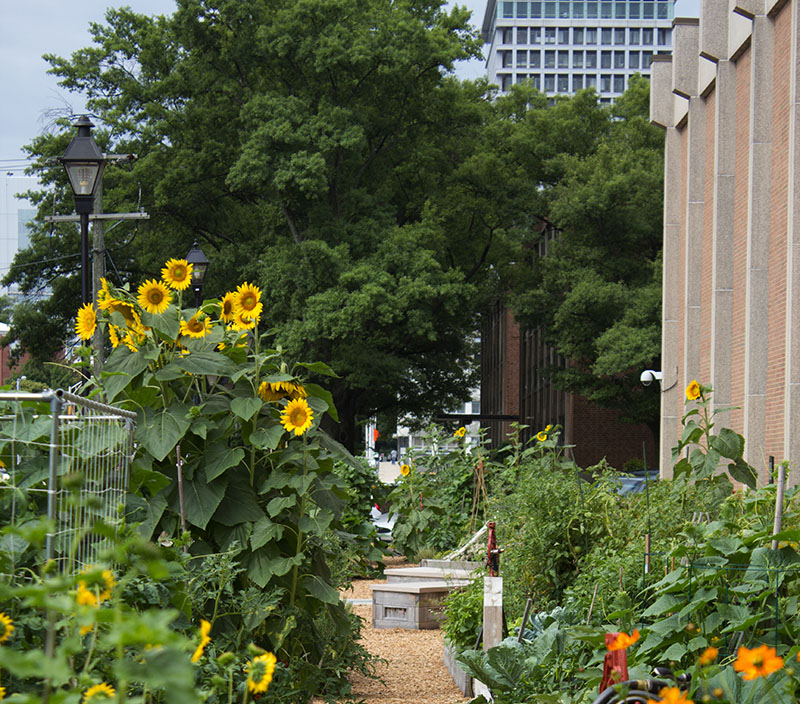Speaking of Sustainability: The E in the ESG at VCU
Compliance Corner – Issue 2.6
(Last month, we took a look at ESG [Environmental, Social and Governance] and the connection between business and corporate responsibility. We also pondered the effects of Gen Z and the Millennials taking over the workforce on the future of ESG. This month, we’ll explore the role of ESG – with a focus on the “E” – in higher ed.)
When many of us think of ESG, we think about Big Business and what the leaders of industry are doing to be good stewards of the resources that fall within their purview. We don’t often include institutions of higher education in that picture, but we should. Like a company, a university has leaders who set the tone for the culture. It has administrators, employees and customers (here, the students), and it has responsibility for the maintenance of its buildings, hardscapes and green spaces.
On the heels of this year’s Earth Day celebrations, and focusing on the “E” for environment, I started looking into ESG in higher ed. Turns out, others have, too. In February of 2022, EY Parthenon (a member firm of Ernst & Young Global Limited) surveyed people at 176 colleges and universities to learn how they felt about their institutions’ commitment to environmental sustainability. What they found was that 75% of their faculty, students, staff, board members, donors and alumni said that “environmental sustainability is important to them, as well as to their stakeholders.”
An organization called AASHE (Association for the Advancement of Sustainability in Higher Education) has been tracking the way colleges and universities support the environment through sustainability efforts since 2010. By participating in their STARS program (Sustainability Tracking, Assessment & Rating System), schools can earn a rating that measures their success – and shortcomings – in this area. I was curious about VCU’s stance on sustainability, and whether or not we participated in the STARS program.

To learn more about ESG at VCU I reached out to Meredith Weiss, the Vice President of Administration.
Following are some highlights from our conversation.
Speaking of Sustainability – With Meredith Weiss
Q: Welcome to Compliance Corner, and thanks so much for speaking with us! As Vice President of Administration at VCU, one of the units you oversee is Facilities Management. Can you tell us what the Facilities Management team is responsible for?
A: Yes, VCU’s Facilities Management Department (FMD) is one of the seven departments within VCU Administration (including Technology Services, VCU Police, Parking and Transportation, Human Resources, Safety and Risk Management and Capital Assets and Real Estate). FMD is responsible for:
- Master planning and design
- Construction (capital construction, renovations and maintenance)
- Space management
- Engineering and utilities
- Sustainability
- Facilities operations (facility maintenance, grounds, housekeeping, carpentry, HVAC/mechanical, and keys/building access)
Q: With the growing concerns about environment and sustainability, have these become a bigger part of the conversation and strategy within VCU administration? And, if an environmentally-conscious person was considering VCU as a place of employment or study, what are some projects you can point to that would show them ways in which we have invested in the environment and sustainability?
A: VCU has been focused on environmental sustainability for many years and recently received a STARS Gold rating in 2021 – national recognition as leaders in higher education sustainability. We now have 22 LEED certified buildings and we are pursuing LEED certification for our new STEM building, which would bring our total to 23. (LEED stands for Leadership in Energy and Environmental Design, and it’s a rating system sponsored by the U.S. Green Building Council.) In addition the university:
- Implemented performance contracting for energy and utilities in order to reduce emissions
- Diverts waste from the landfill by reducing, reusing and recycling methods
- Addresses food insecurity and provides gently-used items to our students through the Ram Pantry and Free Store
- Focuses on alternative transportation options to reduce the number of single-occupancy vehicles on campus, decrease the demand for parking, and increase savings for students and employees. Highlights include the free RamBikes program; free, unlimited transportation via GRTC; and electric vehicle charging stations in parking decks
- Launched the Institute for Sustainable Energy & Environment, a university-level research institute which seeks to be Virginia’s leading source of expertise in areas of clean energy, climate change adaptation and environmental justice. ISEE faculty coordinate across the various disciplines at VCU as well as facilitate national and international collaborations to address climate change. They recently held their inaugural symposium as part of VCU Research Weeks, with top White House Energy Advisor Costa Samaras, Ph.D. serving as the keynote speaker at the two-day symposium. The symposium attracted expert speakers and panelists from diverse fields including a Nobel laureate, as well as local and federal government officials, and industry and community advocates. Puru Jena, Ph.D., distinguished professor in the Department of Physics in the College of Humanities and Sciences, is the inaugural director of the ISEE.

Q: Congratulations on your STARS rating, your LEED certification and the other successes you’ve had! Have there been any challenges along the way, and are there other goals you’d like to reach?
A: Thank you. And yes: In 2008, then VCU President Eugene P. Trani signed the American College and University Presidents’ Climate Commitment, committing VCU to being carbon neutral by 2050. Carbon neutrality is reached when we find the balance between the carbon we emit and the carbon we absorb from the atmosphere. In 2010, VCU President Michael Rao reaffirmed this commitment.
Despite VCU’s many successes, our emissions are not decreasing fast enough to meet these critical carbon neutrality goals. That is why President Rao directed the ONE VCU Sustainability Plan Development Committee to develop a plan to address sustainability holistically for VCU as well as VCU Health System. Now underway, the ONE VCU Sustainability Plan working groups are charged with creating an innovative plan that recognizes the need for urgent change, reflects our aspirations, and acknowledges the scale of our challenges. We expect the development of the plan to be complete next year and implementation to begin in Fall 2024.
We recently previewed the draft goals (below) of the ONE VCU Sustainability Plan with VCU’s Board of Visitors:
- Embed sustainability in the One VCU culture (Ourselves) – This focuses on how we change ourselves to be more sustainable. How can we influence meaningful progress in our community and in the world without seeing that progress in ourselves?
- Enhance student, patient, workforce and community health and well-being by restoring the natural environment and minimizing VCU’s environmental impact (Our community) – This is about how a positive environmental impact can improve health and well-being within our organization as well as in the communities we serve.
- Inspire sustainability innovation in research, education and healthcare to advance environmental health, human health, health equity and economic vitality (Our world) – This highlights our important role in inspiring the next generation of environmental ambassadors as well as leading the development of transdisciplinary solutions to solve the global challenges we face.
Q: Those are some pretty exciting goals. And speaking of excitement, are there projects or efforts around the environment of which you are especially proud?
A: I would say that I am especially proud of the passion of our community members who are collaborating on the ONE VCU Sustainability Plan and the partnerships we have to address the immense challenges ahead of us. We know that for plans this important to be successful, we need to listen to our experts and purposefully create opportunities for everyone to participate and share their ideas. Our goals will be to embed sustainability visibility throughout our culture, enhancing health and well-being in our organization as well as for those we serve. However, we also have to inspire sustainability innovation in research, education and healthcare in order to solve problems nationally and globally and energize the next generation of environmental ambassadors.

Q: We mentioned that VCU earned a Gold STARS rating. How difficult is that to maintain, and what can members of the VCU community do to foster a climate focused on the environment and sustainability?
A: The work we are doing now with the ONE VCU Sustainability Plan will create the momentum we need to not only maintain our rating, but improve it over time. Getting involved with the development of the plan or with VCU Sustainability will help us foster a sustainability culture. Community members are encouraged to join a working group, apply for paid internships with VCU Sustainability or simply share their ideas and ask questions by visiting sustainabilityplan.vcu.edu or interacting with us when we are out in the community.
Q: Thanks for sharing that link; here’s hoping our readers take you up on the opportunity to get involved. Anything else you’d like to share about the environment and sustainability at VCU?
A: We know we cannot buy our way out of these problems; instead we must innovate urgently together. Tackling difficult problems is what we at VCU do best.
Thanks, Vice President Weiss! We couldn’t agree more.
Have an idea for a Compliance Corner post? Contact [email protected]. We’d love to hear from you!
Sources:
Lundy, K., Reynolds, S., & Auton-Smith, S. J. (2022, August 1). ESG in Higher Education, a focus on the environment. EY. https://www.ey.com/en_us/education/strategy-consulting/esg-in-higher-education -a-focus-on-the-environment
